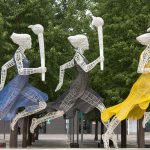Able-bodied people all throughout the COVID-19 pandemic have been fixating on the fact that travelling in 2020 was not (or should not) be on the agenda. Voices we rarely hear or think about when we make travel plans, or when we dream about the white sandy beaches or adventures in different countries and cities, are people who are – every year, no matter the circumstances – being limited by the way able-bodied people prioritise able-bodied travels. E&M has talked to Chris, a 33 year old wheelchair-user who can rarely freely go where he wants due to poor designs, without having to factor in everything that could go wrong.
E&M: Hi Chris! Thank you for sitting down with me! Sooo, who are you? What’s your favourite colour? Your favourite movie?
Chris: Hi! Ok, well, my name is Christopher Schilling, though Chris is fine, I’m 33 and German. To pick a favourite colour is not that easy but somewhere in the dark red spectrum. My favourite movie is the lord of the rings trilogy.
E&M: Sorry to jump right in – why are you in a wheelchair? Can you – if you want to – tell me how it happened?
Chris: Right. Well, I jumped head first into a lake. I didn’t know or check if it was deep enough, which it wasn’t and so completely shattered my fifth vertebra which means I‘m paralyzed from the neck down. Luckily, I only crushed my spinal cord which means I can partially move or trigger movement in my arms and legs. Same applies to the sensation of feeling from the neck down. My body feels numb, but at least there’s some sort of sensation, which I can or have to interpret.
At first I couldn’t move anything, but within a year and a great team of therapists my body recovered and I regained some movement and sensation.
Depending on how far away from my neck or how bad that section of my spinal cord was injured my ability to move or feel varies.
E&M: Thank you for that. Having lived half your live as able-bodied and now half your life as disabled, is there anything you miss? Miss doing?Do you allow yourself to miss things or is it more an approach of: Let’s not look back?
Chris: Honestly, I don’t think about things I can’t change very much. Since I can’t change the past I tend to not look back or try to imagine what if…
E&M: I wish I had your mental strength to do that too! That’s admirable. Let me ask this way: was there anything that was really difficult for you in the years after the accident? Was it meeting people, having to talk about what happened, learning to do things?
Chris: Accepting that change in life wasn’t that hard, I think. My life would have changed anyway. I just finished school and I had to start working. It was just on a totally different level. Learning new or different ways to complete a task was something I don’t mind; I like it in some ways.
Listening to what my body is trying to tell me was and still is difficult. So many even little things influence how or that I have to approach even ordinary daily tasks.
E&M: What about travelling? Have you travelled since you’ve been in a wheelchair?
Chris: Only short trips over the weekend or max. a week where you can “travel” by car.
E&M: Would you like to travel more?
Chris: Yes, but I don’t really know where to go. Mostly I want to relax and recover from work and take a break from the daily routine, as far as possible.
E&M: Do you travel so little because you find it too exhausting, in a world where travelling isn’t made for disabled people?
Chris: You know, preparing for a trip is extremely difficult for me. Even if, for example, a hotel room is declared accessible for handicapped, it doesn’t really mean that it is. You can’t rely on that; you have to investigate every little detail. It’s exhausting.
E&M: What would have to change for you to travel more?
Chris: There are certain standards for a place / (rest)room you need to fulfill to be able to be called “handicapped accessible”. Sometimes the standards aren’t met, even if stated, or the only existing elevator is broken. Of course, these things can happen to anybody, but a “normal” person can normally use an alternative. Only thinking about the discomfort or not being able to use a facility limits my motivation to travel. Being on holiday, what travelling means to me, I shouldn’t have to think about this, if my basic needs are met.
E&M: Do you sometimes dream about being able to walk again?
Chris: Very very rarely, but I have never been able to remember more than 4-5 dreams a year.
E&M: What do you get angry about, as a wheelchair user? Especially when it comes to other people?
Chris: The classic! People parking “just a minute” in handicapped parking spaces. DO NOT DO THAT. Also, people need to stop pushing/touching a wheelchair without asking permission. Most of the time people think that it is helpful but they are entering my personal space and it can even be dangerous when it upsets my balance causing me to fall, which is the worst-case scenario.
E&M: Speaking of which – what do you wish everyone who is not in a wheelchair would understand?
Chris: That almost everything takes more time, thought and preparation than non-disabled people can ever imagine.
E&M: What do you want to tell us, that I haven’t asked you about?
Chris: People need to understand that there are so many different reasons why somebody needs to use a wheelchair.
The answers apply to me specifically. Every clinical picture is different and most of the time not easy to spot. If you don’t know me, if or how I can do whatever comes to your mind, just ask. I don’t mind that. If what you’re asking is none of your business, I will tell you, but there are no hard feelings.
E&M: Chris, thank you so much. I want you to travel the world. They’d be lucky to have you!
Cover photo by Vidar Nordli-Mathisen on Unsplash










